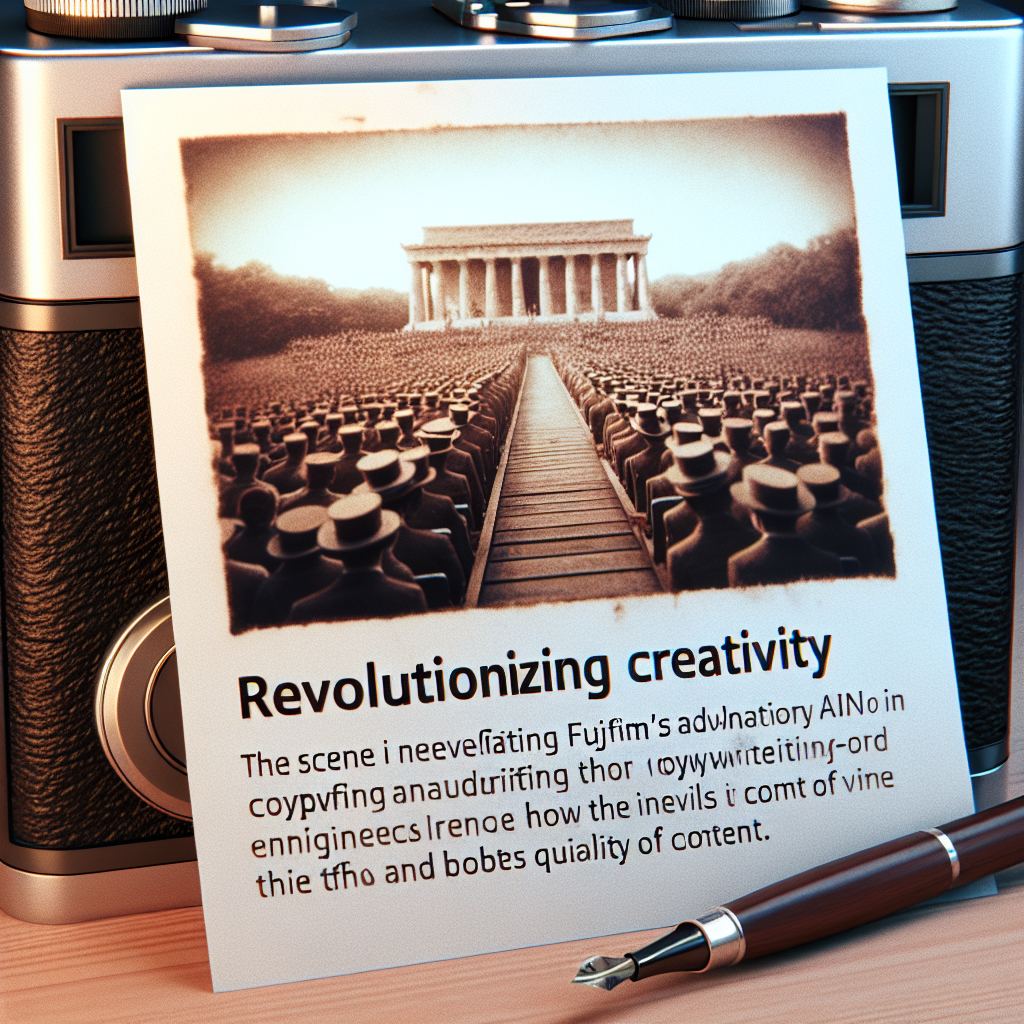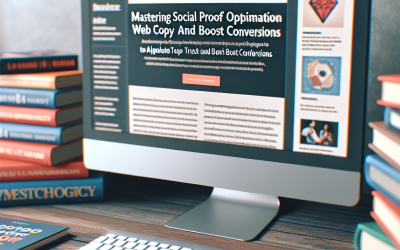Revolutionizing Creativity: How the Future of AI in Copywriting Will Elevate Content and Boost Engagement
In my experience researching the the future of ai in copywriting, I’ve been fascinated by how rapidly this technology is evolving and shaping our creative landscape. I want to share what I’ve learned about this exciting frontier, especially how AI’s role is set to elevate content quality and increase engagement. From what I’ve seen, the the future of ai in copywriting promises not only efficiency but also a new level of personalization that was previously unimaginable.
In my exploration of the future of ai in copywriting, I’ve discovered that many professionals are both excited and cautious about these advancements. I believe that understanding the trajectory of AI’s involvement in copywriting can help us adapt and thrive in this new era. I want to guide you through my insights, experiences, and predictions, so you can see how the the future of ai in copywriting might revolutionize our creative processes for years to come.
Understanding the Future of AI in Copywriting
The Evolution of AI Technologies in Content
From my research, I’ve learned that AI tools have come a long way, starting from simple keyword generators to sophisticated language models. I’ve personally experimented with some of these tools, and I’ve found that the the future of ai in copywriting involves increasingly advanced natural language processing capabilities. These tools can now craft compelling narratives, optimize SEO, and even mimic human tone with remarkable accuracy.
In my experience, the key to harnessing AI effectively lies in understanding its limitations and strengths. I recommend that content creators stay updated with emerging AI innovations because, in the the future of ai in copywriting, we’re likely to see smarter, more intuitive systems that can generate content tailored to specific audiences and goals. This evolution is truly transforming how we approach copywriting and content marketing.
Implications for Content Strategy and Creativity
I’ve discovered that AI’s growing role in copywriting means that content strategies will become more data-driven and personalized. In my experience, AI can analyze vast amounts of user data to help craft messages that resonate deeply with target audiences. I believe that the the future of ai in copywriting involves a shift towards leveraging AI-generated insights to inform creative decisions, rather than replacing human creativity altogether.
I recommend that marketers and writers embrace AI as a collaborative partner—one that enhances our creative output while allowing us to focus on more strategic, high-level tasks. From what I’ve learned, the the future of ai in copywriting promises a blend of human ingenuity and machine intelligence to produce content that is both engaging and highly targeted.
Transforming Content Creation with AI
Personalization and Audience Engagement
In my experience, one of the most exciting aspects of the the future of ai in copywriting is its ability to personalize content at scale. I’ve found that AI can analyze user behavior, preferences, and demographics to generate tailored messages that truly speak to individual needs. This level of personalization was difficult to achieve manually, but now it’s becoming mainstream.
I recommend leveraging AI tools for audience segmentation and dynamic content creation. From what I’ve seen, this approach significantly boosts engagement rates because audiences feel seen and understood—something that’s at the heart of effective copywriting in the the future of ai in copywriting.
Enhanced Creativity and Idea Generation
I’ve discovered that AI isn’t just about automating routine tasks; it can also inspire new ideas. I’ve experimented with AI-powered brainstorming tools that suggest angles, headlines, and content structures I hadn’t considered. I believe that the future of ai in copywriting will see AI becoming a creative partner—helping us push boundaries and explore innovative concepts.
I recommend that writers view AI as an extension of their creativity, not a replacement. From my perspective, the synergy between human intuition and machine-generated suggestions can lead to content that feels fresh, authentic, and highly engaging.
Practical Applications and Personal Insights
Automating Routine Tasks
In my journey exploring the future of ai in copywriting, I’ve found that automating repetitive tasks like headline generation, meta descriptions, and email drafts frees up more time for strategic thinking. I’ve used AI tools to quickly produce multiple variants of a message, then refined the best options manually. This process has greatly increased my productivity.
I recommend that content teams adopt AI for these routine tasks early on, as it allows us to focus on higher-level creative and strategic work. From what I’ve experienced, the future of ai in copywriting will make this automation even more seamless and intuitive, transforming how we approach content workflows.
Data-Driven Content Optimization
Based on my research, I’ve learned that AI-driven analytics can help optimize content performance in real-time. I’ve implemented AI tools that track reader engagement, bounce rates, and conversion metrics, providing actionable insights. I believe that in the the future of ai in copywriting, data-driven decision-making will be the norm, enabling us to tweak content for maximum impact constantly.
I recommend adopting these AI-powered analytics to better understand audience responses. From my perspective, this approach ensures our content remains relevant, engaging, and aligned with audience preferences, which is crucial in the the future of ai in copywriting.
The Future of AI in Copywriting: Challenges and Opportunities
Addressing Ethical Concerns
In my experience, one of the biggest challenges in the the future of ai in copywriting is ensuring ethical use. I’ve seen debates about AI-generated content and authenticity. I believe that transparency is key—being honest with audiences about AI involvement helps build trust. I recommend that creators establish clear guidelines to avoid misuse or misinformation.
From what I’ve learned, addressing these ethical considerations is essential for sustainable growth in this field. I believe that as AI continues to evolve, so must our standards and practices to ensure it enhances, rather than compromises, our integrity in copywriting.
Opportunities for Growth and Innovation
I’ve found that the the future of ai in copywriting presents unprecedented opportunities for innovation. AI can help us reach new markets, develop personalized content at scale, and even create new forms of interactive storytelling. I believe that embracing these opportunities will set us apart in a competitive landscape.
I recommend that content creators stay open-minded and experiment with emerging AI tools. From my perspective, the key to thriving in this evolving space is adaptability and a willingness to learn—traits that will define success in the the future of ai in copywriting.
References and Resources
Throughout my research on the the future of ai in copywriting, I’ve found these resources incredibly valuable. I recommend checking them out for additional insights:
Authoritative Sources on the future of ai in copywriting
-
OpenAI Research on Language Models
openai.comThis resource offers in-depth insights into how advanced AI models like GPT are shaping the the future of ai in copywriting and content generation.
-
MIT AI Research
mit.eduMIT’s research papers and articles explore the advancements and ethical considerations surrounding AI in content creation, offering valuable perspectives on the the future of ai in copywriting.
-
Content Marketing Institute
contentmarketinginstitute.comThis industry leader provides practical guides on integrating AI into content marketing strategies, which I believe is crucial as we navigate the the future of ai in copywriting.
-
Wired Magazine
wired.comWired covers the latest trends and ethical debates around AI, providing valuable context for understanding the societal impact of the future of ai in copywriting.
-
Academic Journals on AI and Copywriting
tandfonline.comAccess scholarly research on AI’s impact on language, creativity, and communication, essential for a comprehensive understanding of the the future of ai in copywriting.
-
Forbes Technology
forbes.comFeatures articles on AI innovations, startups, and industry trends, helping me stay ahead in understanding how the the future of ai in copywriting will shape business success.
-
Google AI Research
ai.google/researchGoogle’s research provides cutting-edge insights into AI language understanding, crucial for anticipating how the the future of ai in copywriting might evolve.
-
Reuters Technology News
reuters.com/technologyProvides updates on industry movements, acquisitions, and innovations influencing the the future of ai in copywriting, keeping me informed of market trends.
Frequently Asked Questions
How is AI transforming the landscape of copywriting today?
In my experience, AI is revolutionizing copywriting by automating routine tasks, enhancing personalization, and inspiring creativity. I’ve used AI tools to generate multiple headline options quickly, which saves me time and opens up new avenues for engaging content. I believe that the the future of ai in copywriting will see these capabilities becoming even more sophisticated, allowing us to craft highly targeted and dynamic content effortlessly.
What are the main challenges associated with AI in copywriting?
From my perspective, ethical concerns, such as authenticity and misinformation, are significant challenges. I’ve found that transparency about AI-generated content is essential to maintain trust. I believe that as we progress, the the future of ai in copywriting will require us to develop strict guidelines and ethical standards to ensure AI is used responsibly and ethically.
Will AI replace human copywriters in the future?
In my experience, I believe AI is more of a collaborator than a replacement. I’ve seen how AI can handle repetitive tasks and generate initial drafts, freeing humans to focus on strategy and storytelling. I believe that in the the future of ai in copywriting, the most successful professionals will be those who seamlessly integrate AI into their workflows, enhancing their creativity rather than replacing it.
How can content creators prepare for the the future of ai in copywriting?
Based on my experience, staying updated with the latest AI tools, understanding their capabilities, and developing new skills in data analysis and AI ethics are crucial. I recommend embracing continuous learning and experimentation. From what I’ve learned, adapting to the the future of ai in copywriting will require flexibility and a mindset open to innovation, ensuring we remain relevant and competitive in this evolving landscape.
Conclusion
In conclusion, my research on the the future of ai in copywriting has shown that AI is poised to fundamentally change how we create, optimize, and personalize content. I believe that embracing these advancements can elevate our work, making it more engaging and impactful. I hope this guide helps you understand the potential and challenges of the the future of ai in copywriting, so you can prepare and thrive in this exciting new era.
Find out more information about “the future of ai in copywriting”
Search for more resources and information:










